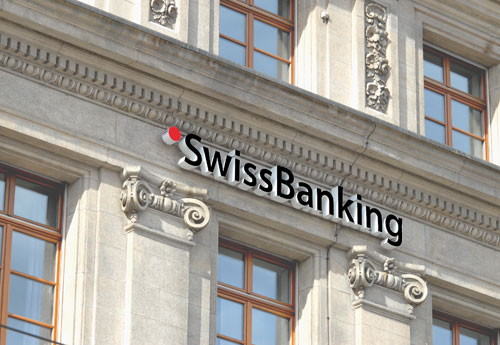Future challenges tax Swiss bankers

The Swiss banking sector is keeping its head above water in increasingly choppy seas, but must pass a series of crucial tests to thrive in future, according to the industry’s lobby group.
The Swiss Bankers Association (SBA) identified rampant regulation, the global tax evasion row and barriers to key markets as the main challenges ahead.
Swiss banks suffered a 3.8 per cent drop in turnover last year to SFr59.4 billion ($62 billion), the SBA reported on Tuesday. Profits (SFr13 billion) and the number of employees (108,100) remained stable, but banks have shed a number of those jobs already this year.
But the still unresolved tax evasion dispute is hanging over the industry like a dark cloud and could hinder growth prospects once the global economy starts to improve.
Withholding tax deals with Austria and Britain are done and dusted, but political opponents in Germany, the most important partner, are threatening to torpedo the government’s agreement with Switzerland.
The latest dark twist to the tax evasion saga is taking place in the United States, where the authorities have pieced together enough information (from voluntary tax disclosures and the handover of Swiss banking data) to identify employees – leaving them open to potential prosecutions.
Political deal
“The affected banks are unconditionally responsible for providing their employees with all the support they need,” said SBA chairman Patrick Odier. “Our association wants to help reconcile the interests of all involved parties, both on a judicial and moral level.”
SBA chief executive Claude-Alain Margelisch emphasised that the handover of Swiss bank data was unavoidable but urged politicians to strike a deal that would protect employees from criminal prosecution in the US.
“We have found a solution [Rubik withholding tax agreements] with Germany, Britain and Austria that comes with no risk of future prosecution,” Margelisch told swissinfo.ch. “We want to reach the same agreement with the US.”
The SBA said it continued to support changes to Swiss laws that would enable the funds and alternative investment sectors to operate more efficiently in global markets.
But for the asset management business to develop into a more prominent industry in Switzerland, as the SBA would like, it is essential that pressure is maintained on the European Union to ditch protectionist measures in proposed new financial regulations.
Regulations, regulations
“The most important challenge is to ensure that we maintain market access. We have to make sure that the text of new EU regulations does not discriminate against Switzerland,” Margelisch said.
Closer to home, the relationship between commercial banks, the financial regulator and the central bank has been showing signs of strain in recent months.
A raft of new regulations, sponsored by the Swiss Financial Market Supervisory Authority (Finma) and the Swiss National Bank (SNB), has reached its limit, according to the SBA.
Banks have been saddled with “too big to fail” regulations, enhanced capital requirements, new rules to protect the interests of investors and constraints on mortgage lending.
Furthermore, the SNB has twice fired recent warning shots over the bows of the banking sector indicating that it still was not satisfied with the levels of stability.
In June, the SNB singled out Credit Suisse and UBS for failing to implement new regulations fast enough. And on Monday, SNB chairman Thomas Jordan warned that the Swiss financial sector could still “propagate large financial shocks to the rest of the economy.”
Chinese hope
Margelisch believes that the time has come to redress the balance between protecting investors and the stability of the financial sector and allowing banks to make profits.
“We have seen that conditions for the activities of banks have clearly suffered and we have to correct this situation,” he said. “We need the right conditions to maintain the global competitiveness of our banks as competition abroad increases.”
One ray of light for the SBA is the encouraging feedback it has received from China concerning Switzerland’s proposed role as a major global trading hub for the renminbi.
As China slowly releases controls on its currency, it is foreseen that the renminbi could challenge the dollar in the near future as a global currency of trade and credit.
Britain has already leveraged its historical connections with Hong Kong to position London as a centre for renminbi currency trades and Switzerland wants to follow suit.
“Switzerland is already the global number four player in renminbi transactions and services,” Margelisch said. “We want to find a solution to get a direct connection to the central bank of China.”
The SBA’s annual banking barometer, which measures the health of the sector, has shown the industry to be holding its own in difficult conditions.
Turnover dropped 3.8% to SFr59.4 billion last year, but profits remained stable at SFr13 billion thanks to cost cutting measures.
Assets under management sank from SFr5.47 trillion in 2010 to SFr5.27 trillion last year, largely as a result of the falling valuation of securities.
Significantly, half of all assets managed by Swiss banks are foreign owned. The SBA held this up as evidence that wealthy foreigners are not moving their money to other countries, such as Singapore.
The Swiss banking sector employed 108,100 people in 2011, marginally up on 2010.
But 1,070 jobs were cut in the first half of this year, with the SBA warning that the trend is likely to continue.
An SBA/BAK Basel report earlier this year estimated that for every 100 jobs lost in the banking sector, the Swiss economy lost an additional 115 positions in support industries.

In compliance with the JTI standards
More: SWI swissinfo.ch certified by the Journalism Trust Initiative





You can find an overview of ongoing debates with our journalists here. Please join us!
If you want to start a conversation about a topic raised in this article or want to report factual errors, email us at english@swissinfo.ch.